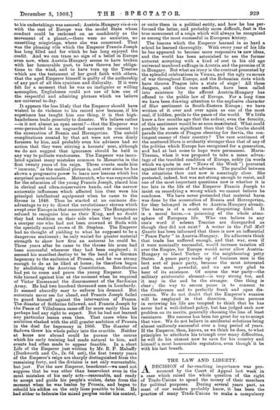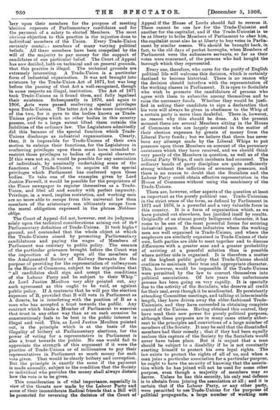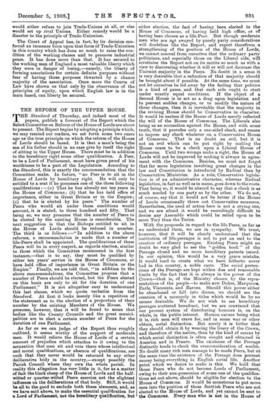THE LAW AND LIBERTY.
ADECISION of far-reaching importance was pro- nounced by the Court of Appeal last week in a case which raised the whole question of the right of Trade-Unions to spend the money of their members for political purposes. During several years past, as most of our readers probably know, it has been the practice of many Trade-Unions to make a compulsory levy upon their members for the purpose of meeting ielection expenses of Parliamentary candidates and for the payment of a salary to elected Members. The most 'obvious objection to this practice is the injustice done to individual members of the Union. Every Trade-Union certainly contaie3 members of many varying political .beliefs. All these members have been compelled by the will of the majority to pay money for the support of candidates of one particular belief. The Court of Appeal has now decided, both on technical and on general grounds, that this practice is illegal. The technical grounds are extremely interesting. A Trade-Union is a particular form of industrial organisation. It was not brought into existence by the Trade-Union Act of 1871, but was long before the passing of that Act a well-recognised, though in some respects an illegal, institution. The Act of 1871 took Trade-Unions as it found them, and fully legalised their existence. Subsequently in 1876, and again in 1906, acts were passed conferring special privileges upon Trade-Unions. The latter Act is the more important of the two, for it gave to the bodies known as Trade- Unions privileges which no other bodies in this country possess, and to a large extent lifted them outside the liabilities of the ordinary law. The Legislature admittedly did this because of the special function which Trade- Unions discharge as industrial organisations. Clearly, then, it is impossible for Trade-Unions of their own motion to enlarge their functions, for the Legislature in conferring privileges upon them must have intended to restrict those privileges to bodies of a special character. If this were not so, it would be possible for any association of individuals, by nominally undertaking some of the functions of Trade-Unions, to acquire all the special privileges which Parliament has conferred upon those bodies. To take one of the examples given by Lord Justice Farwell, it would be possible for the proprietors of the Times newspaper to register themselves as a. Trade- Union, and libel all and sundry with perfect impunity. Privilege, in a word, implies restriction, and working men are no more able to escape from this universal law than members of the aristocracy can ultimately escape from the moral obligation expressed in the phrase Noblesse oblige.
The Court of Appeal did not, however, rest its judgmen solely upon the technical considerations arising out of the Parliamentary definition of Trade-Unions. It took highe r ground, and contended that the whole object at which the Trade-Unions aimed by promoting Parliamentary candidatures and paying the wages of Members of Parliament was contrary to public policy. The essence of the particular grievance brought before the Court was the imposition of a levy upon all the members of the Amalgamated Society of Railway Servants for the purpose of providing for the representation of railwaymen in the House of Commons, subject to the stipulation that "all candidates shall sign and accept the conditions of the Labour Party and be subject to their Whip." As Lord Justice Moulton very ably pointed out, any such agreement as this ought to be void, as against public policy. If A contracts that he will pay the election expenses of B, provided that B will vote in Parliament as A directs, he is interfering with the position of B as a man who has accepted a trust towards the public. Any contract which binds a Member of Parliament to exercise that trust in any other way than as on each occasion he conscientiously feels to be best in the public interest is illegal and void. This, as Lord Justice Moulton pointed out, is the principle which is at the basis of the illegality of bribery at Parliamentary elections, for the power of voting for a representative in Parliament is also a trust towards the public. No one would fail to appreciate the strength of this argument if it were the practice of Trade-Unions or of millionaires to pay their representatives in Parliament so much money for each vote given. That would be clearly bribery and corruption. But the principle is exactly the same if the payment is made annually, subject to the condition that the Society or individual who provides the money shall always dictate how the vote is to be given.
This consideration is of vital importan0e, espeoiallY in view of the threats now made by the Labour Party and porno of their inconsiderate Radical friends that a Bill will be promoted for reversing the decision of the Court of Appeal if the House of Lords should fail to reverse it. There cannot be one law for the Trade-Unionist and another for the capitalist, and if the Trade-Unionist is to be at liberty to bribe Members of Parliament to obey him, the capitalist must also be at liberty to buy votes in Parlia- ment by similar means. We should be brought back, in fact, to the old days of pocket boroughs, when Members of Parliament were the submissve servants, so far as their votes were concerned, of the persons who had bought the borough which they represented.
Every one, therefore, who cares for the purity of English political life will welcome this decision, which is certainly destined to become historical. There is no reason why the decision should interfere with the representation of the working classes in Parliament. It is open to Socialists who wish to promote the candidature of persona who agree with them to subscribe among themselves and to raise the necessary funds. Whether they would be justi- fied in asking their candidate to sign a declaration that his vote will always be given in obedience to the Whip of a certain party is more than doubtful. There is, however, no reason why this should be done. At the present moment there are several Members sitting in the House of Commons who are largely assisted in the matter of their election expenses by grants of money from the Liberal Party funds ; but we believe that there has never been any attempt made by the Liberal Whips to put pressure upon those Members on account of the pecuniary assistance which they have received, and we should think very poorly of the Members in question, as well as of the Liberal Party Whips, if such incidents had occurred. The ordinary bonds of party discipline are quite sufficiently strong without the infliction of economic pressure, and there is no reason to doubt that the Socialists and the Labour Party could obtain effective representation in the House of Commons without using the machinery of the Trade-Unions.
There are, however, other aspects of the question at least as important as the purely political one. Trade-Unionism in the strict sense of the term, as defined by Parliament in 1871 and 1876, is a powerful and a very valuable force in this country. It is a form of organisation which, as we have pointed out elsewhere, has justified itself by results. Originally of an almost purely belligerent character, it has come to be one of the most powerful forces for securing industrial peace. In those industries where the working men are well organised in Trade-Unions, and where the employers are similarly organised in Trade-Unions of their own, both parties are able to meet together and to discuss differences with a greater ease and a greater probability of arriving at a peaceful solution than is possible where neither side is organised. It is therefore a matter of the highest public policy that Trade-Unions should continue to maintain their true and appropriate character. This, however, would be impossible if the Trade-Unions were permitted by the law to convert themselves into political associations. Of late years this unfortunate process has been going on very rapidly. It is specially due to the activity of the Socialists, who deserve all credit for their zeal, even though it be misdirected. By persistently attending Committee meetings, and talking at inter minable length, they have driven away the older-fashioned Trade- Unionists, and they have succeeded in obtaining complete control of the Unions. Having obtained this control, they have used their new power for purely political purposes, although these purposes are in many cases utterly abhor- rent to the principles and convictions a a large number of members of the Society. It may be said that the dissatisfied members had their remedy; that if they had been equally zealous this capture of the Society by the Socialists would never have taken place. But it is unjust that a man should be subject to a disability if be is not constantly exerting himself to protect his own legal rights. The law exists to protect the rights of all of us, and when a man joins a particular association for a particular purpose, he ought to have the security of knowing that the associa- tion which he has joined will not be used for some other purpose, even though a majority of members may so decree. Unless he has this security, his only real defence is to abstain from joining the association at all ; and it is certain that if the Labour Party, or any other party, were permitted to use Trade-Unions for the purposes of political propaganda, 'a large number 'cif working radii would either refuse to join Trade-Unions at all, or else would set up rival Unions. Either remedy would be a disaster to the principle of Trade-Unionism.
The Court of Appeal has, in fact, by its decision con- ferred an immense boon upon that form of Trade-Unionism in this country which has done so much to raise the con- dition of the working classes and to promote industrial peace. It has done more than that. It has secured to the working men of England a most valuable liberty which they were in danger of losing,—namely, the liberty of forming associations for certain definite purposes without fear of having those purposes thwarted by a. chance majority of the association. Once more the Courts of Law have shown us that only by the observance of the principles of equity, upon which English law is in the main based, can liberty be secured.








































































 Previous page
Previous page